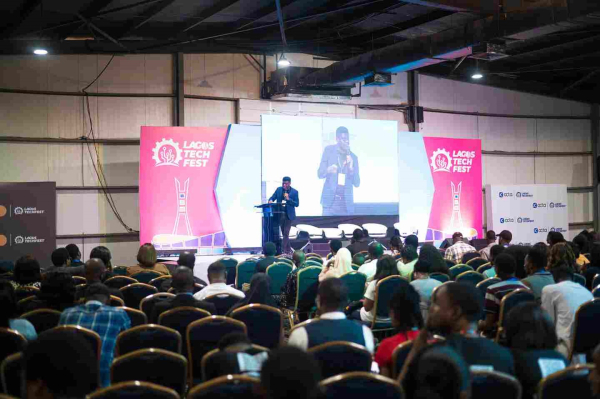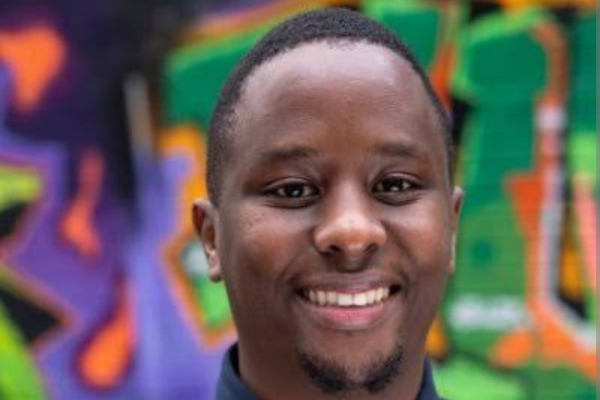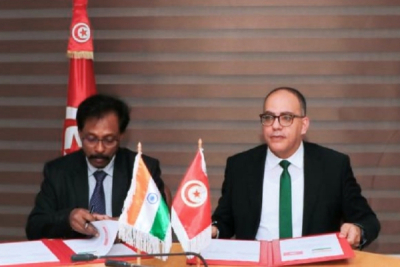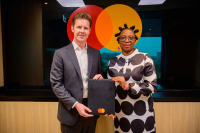Lagos Tech Fest 2025 returns on February 19-20 for its 5th edition, offering a dynamic two-day event celebrating Nigeria's tech ecosystem. The event is open to startup founders, investors, or tech enthusiasts for networking and innovation.
This year, the festival expands to include Nigeria's Tech Leadership Roundtable, exclusive after-dark hours for networking, a live expo, and multiple stages for diverse sessions. Various topics, including AI/cloud, fintech, financial inclusion, startups, and more, will be discussed.
As an entrepreneur, he is actively dedicated to advancing financial inclusion across Africa, with a specific emphasis on empowering young people. He utilizes technology to achieve this objective.
Kiiru Muhoya (photo) is a Kenyan entrepreneur and tech innovator specializing in the financial sector. He is the co-founder and CEO of Fingo Africa, a fintech startup developing a pan-African neobank tailored for the continent's youth.
Founded in 2020, Fingo Africa is a digital bank designed to meet the needs of young Africans. Its mission is to empower this generation to contribute to a more prosperous Africa through accessible financial tools. The platform enables users to manage daily expenses, set savings goals, and plan for their financial future. Through its partnership with Ecobank, Fingo Africa benefits from the bank's presence in 33 countries across the continent, accelerating its expansion.
“Fingo allows users to download the ‘Fingo Africa’ app and receive access to a bank account in under 5 minutes, paired with free peer-to-peer transactions and immediate access to multiple services such as savings, financial education and smart spending analytics,” according to the company’s website.
The startup also offers FingoPay, a comprehensive solution designed to meet the needs of both small and large businesses. This service incorporates advanced analytics tools, providing entrepreneurs with real-time insights into their business performance.
Before launching Fingo Africa, Kiiru Muhoya founded Build for Kenya in 2016, a social enterprise focused on developing affordable housing.
A graduate of the University of Warwick in England, Muhoya holds a bachelor's degree in philosophy, politics, and economics. He also served as President of the Warwick Africa Summit and worked as Executive Assistant to the CEO of Acorn, a Kenyan real estate company, between 2019 and 2020.
By Melchior Koba
Editing by Sèna D. B. de Sodji
With a deep understanding of Cameroon's entrepreneurial ecosystem, Ngala Boris leverages his experience to guide and mentor aspiring young entrepreneurs. He provides them with the support they need to increase the chances of their projects succeeding.
Ngala Boris is an experienced Cameroonian entrepreneur and investor. He is the founder and CEO of the Boris Bison Youth Empowerment Incubator (BBIncubator).
Founded in 2020, BBIncubator aims to combat poverty in Cameroon by providing young entrepreneurs with a supportive environment to realize their ambitions. The incubator offers a spacious, secure, and Internet-connected workspace, along with round-the-clock technical support. It also provides networking opportunities and free seed funding for 20 selected entrepreneurs per cohort.
Through its incubation program, BBIncubator supports young entrepreneurs by training and mentoring them every three months. This program helps familiarize them with the entrepreneurial ecosystem, develop governance and project management skills, and adopt best business practices.
The incubator also teaches participants how to leverage the Internet to grow their businesses by improving communication and business correspondence skills. It trains them in using modern payment gateways for fast and efficient transactions and in loan management to support their projects.
In 2023, BBIncubator launched "Finance Your Startup" pitch competition, enabling entrepreneurs to present their tech ideas to a jury, with the winner receiving CFA 1 million (approximately $1,600) in startup funding.
In addition to BBIncubator, Ngala Boris is the founder and CEO of Boris Bison Sarl, established in 2020. The company operates in various sectors, including agriculture, import-export, real estate, contracting, and supply chain management. The business management graduate also serves as Vice President of the National Federation of Incubation Structures of Cameroon (FENASIC), an association of public and private incubators.
By Melchior Koba,
Editing by Sèna D. B. de Sodji
In recent years, the Republic of the Congo has undertaken a significant digital transformation, characterized by substantial infrastructure development. To successfully navigate this transition, the country requires committed stakeholders to spearhead and support initiatives focused on modernizing the nation and fostering greater digital inclusion.
The government of Congo-Brazzaville carried out a cabinet reshuffle on Saturday, January 11. Some ministers retained their positions, including Léon Juste Ibombo, Minister of Posts, Telecommunications, and the Digital Economy. His reappointment underscores the government's commitment to continuing the momentum initiated in 2015 to leverage digital technology as a driver of economic and social transformation.
Major Achievements
Since his appointment, Léon Juste Ibombo has spearheaded ambitious initiatives aimed at modernizing digital infrastructure and enhancing technological inclusion. Under his leadership, several large-scale projects have been launched. The construction of the national backbone has improved internet connectivity across the country. The launch of the "Caria Tech Village," a technology park, has fostered innovation and attracted investments in the digital sector. The digitization of public services, notably through the introduction of a digital driver's license, has modernized administrative processes.
The Digital Transformation Acceleration Project, funded by the World Bank, has also improved internet access, including in rural areas. These accomplishments have also led to deploying fiber optics and introducing 4G and 5G technologies, making Congo the first country in the subregion to adopt such advanced connectivity.
Challenges and Strategic Priorities
Despite these advances, the country needs to consolidate its progress by undertaking several projects. One of the top priorities is developing a national artificial intelligence (AI) strategy that incorporates solutions tailored to local needs. The creation of an e-government portal, centralizing online administrative services, is another critical objective. Furthermore, improving AI research is essential to strengthen the country's scientific capabilities in strategic fields.
The minister is also working on establishing a dynamic startup ecosystem, with programs dedicated to young entrepreneurs in the tech sector. Initiatives to bridge the digital divide, such as providing internet access to schools and remote communities, are central to his agenda. These efforts reflect a strategic vision to position Congo as a key player in the digital economy in Central Africa. In 2024, Léon Juste Ibombo was featured in the annual ranking of the 50 most influential figures in African tech, compiled by We Are Tech Africa. This recognition highlights his pivotal role in the ongoing transformation of the sector.
By Samira Njoya,
Editing by Sèna D. B. de Sodji
International collaborations in the digital sector are essential for fostering innovation and sharing expertise. By joining forces, countries drive technological development, create economic opportunities, and enhance their competitiveness on the global stage.
Tunisia and India aim to deepen their collaboration in the technology sector, a shared ambition that took center stage at the fifth meeting of the Tunisia-India Joint Committee on Scientific and Technological Cooperation. The meeting was held on Wednesday, January 8, at the Ministry of Higher Education and Scientific Research in Tunis.
During the discussions, both countries agreed to launch a call for proposals to fund joint initiatives focusing on priority areas such as environmental innovation, e-health, and geospatial technology. These projects will involve economic and social stakeholders and be complemented by joint workshops to foster exchanges and collaboration between Tunisian and Indian researchers.
The initiative builds on the scientific cooperation agreement signed in 1995 and the 2020 partnership that established the Tunisia-India ICT Innovation Center.
The collaboration offers mutual benefits. India, renowned for its expertise in digital and geospatial technologies, provides Tunisia with a valuable opportunity to leverage its know-how while strengthening local research and innovation capacities. The strategic partnership also allows India to expand its ties with North Africa and bolster its influence in key technological fields, including innovation hubs and drone applications.
Tunisia, meanwhile, is one of Africa's most dynamic countries in digital development. According to the ICT Development Index 2024 by the International Telecommunication Union (ITU), Tunisia ranks 8th in Africa with a score of 77.2 out of 100, highlighting significant progress in its ICT sector.
By Samira Njoya,
Editing by Sèna D. B. de Sodji
Digital transformation is at the heart of Mali's socio-economic development plans. To bring these ambitions to life, the government is focusing on strengthening the security of the national cyberspace.
The Malian government plans to adopt its national cybersecurity strategy this year, according to Government News Bulletin No. 249 published on Friday. The bulletin outlines the Ministry of Communication, Digital Economy, and Administrative Modernization's 2024 performance review and 2025 prospects.
"Cybersecurity is a major global concern as the sophistication of cyberattacks and the financial damage they cause to countries have risen exponentially. Indeed, the rapid pace of innovation in the ICT sector has led to inadequate legislative and regulatory cybersecurity frameworks," states the draft national cybersecurity strategy, which began validation in January 2024.
The adoption of this strategy is deemed essential as the Malian government aims to build a strong and resilient digital Mali, leveraging digital technology as a driver of economic growth, modernization, and prosperity. The strategy seeks to enhance cybersecurity governance, strengthen international cooperation, and foster a culture of cybersecurity through information, training, and research. It also includes measures to protect critical infrastructure, notably through the establishment of security standards and frameworks.
Currently, Mali is ranked in the fourth tier (Tier 4) out of five in cybersecurity by the International Telecommunication Union (ITU) in its Global Cybersecurity Index 2024. This tier comprises countries with an overall score of at least 20/100, demonstrating basic cybersecurity commitment, with government actions aimed at assessing, establishing, or implementing generally accepted cybersecurity measures in at least one domain.
The strategy is still in the development phase. Furthermore, a mere adoption is not enough. It is crucial to implement the actions it outlines. The ITU notes that Mali has a relatively strong performance in legislative measures, scoring 12.36 out of 20 in this pillar. However, significant efforts are required in other areas: technical measures (4.56 out of 20), organizational measures (2.9 out of 20), capacity development (0.79 out of 20), and cooperation (8.87 out of 20).
By Isaac K. Kassouwi
Editing by Sèna D. B. de Sodji
CcHub has partnered with the Mastercard Foundation to support edtech startups focused on improving learning outcomes and expanding access to quality education in Africa.
The program offers $100,000 in equity-free funding, expert mentorship in design, product development, and technology, and connections to investors to help startups scale.
Eligible startups must be Africa-focused, incorporated in Nigeria, and provide solutions addressing challenges in K-12 education, tertiary education, or vocational training. The program encourages inclusive teams and especially welcomes female-led startups.
Applications are open until January 31, 2025.
Interoperability between banks and non-banking financial service providers makes financial services more accessible to unbanked and underbanked populations. As many Africans remain unbanked, integrating digital payment solutions into everyday transactions can help bridge the gap between the banked and unbanked.
The Kingdom of Eswatini has launched the Eswatini Payment Switch (EPS), a platform enabling real-time, interoperable transactions across banks and non-banks. Paylogic, the provider behind its development, announced the rollout on January 7.
Commenting on the development, Mohamed Mekouar, Executive Chairman of PayLogic said, "We are honored to partner with the Central Bank of Eswatini in this transformative project. The Eswatini Payment Switch is a testament to our commitment to advancing digital payments and financial inclusion across Africa."
The EPS marks a significant step toward creating a cash-lite economy by reducing dependency on cash transactions. The system allows payments to be processed within seconds, ensuring seamless, 24/7 service availability, including weekends and holidays.
The EPS enhances interoperability among financial institutions, fostering a more inclusive and interconnected financial ecosystem. This innovation is expected to drive financial inclusion and digital transformation, enabling individuals and businesses to access faster and more secure payment services.
This initiative aligns with Eswatini's broader push to modernize its payment infrastructure, drive economic growth, and expand financial access for its citizens. The country has made notable progress in embracing digital payments, led by the Central Bank of Eswatini (CBE) through its National Payment System (NPS) Vision 2025, which focuses on achieving interoperable, real-time, and 24/7 payment capabilities.
By ensuring interoperability and real-time processing, the platform positions Eswatini as a leader in embracing digital financial solutions in the region.
Hikmatu Bilali
Africa is experiencing a rapid shift toward digital payments, fueled by increased smartphone penetration and internet usage. Mastercard’s expertise in secure and scalable payment systems can complement and enhance these existing platforms.
Mastercard has opened its first office in Accra, Ghana, a key step in its West Africa expansion. This move, announced yesterday January 13, reflects its commitment to supporting Ghana’s digital economy through innovative financial products and services tailored to the local market.
“Opening our office in Ghana marks an important milestone in our commitment to deepening relationships across the region. Our growth strategy for West Africa is ambitious, and establishing a formal presence here allows us to better serve the specific needs of our customers,” said Mark Elliott, Division President for Africa at Mastercard.
The new office underscores Mastercard’s dedication to fostering stakeholder relationships and promoting inclusive growth. By establishing a presence in Ghana, Mastercard aims to enhance collaborations and accelerate the adoption of tailored financial solutions.
Beyond the office, Mastercard has collaborated with companies like Kalabash, KaiOS, Boost, and Smile ID, and partnered with banks such as Access Bank and Fidelity Bank to improve cross-border payment solutions. These efforts have empowered fintechs, expanded digital access for underserved communities, and strengthened Ghana’s position as a tech hub.
Mastercard’s office in Accra is a strategic response to the growing demand for secure, efficient, and inclusive financial solutions in Ghana and West Africa. By leveraging its global expertise and fostering local partnerships, Mastercard is set to play a pivotal role in transforming Ghana’s financial landscape and contributing to the region’s digital future.
The 2021 Financial Services Demand-Side Survey Report by the Ministry of Finance reveals that Ghana has achieved a remarkable 96% financial inclusion, leaving only 4% of the population without access to financial services. This significant progress is primarily driven by the widespread adoption of mobile money nationwide. It underscores the growing digitalization of Ghana's economy, creating opportunities for fintech innovation, e-commerce, and digital payments.
Ghana’s near-universal financial inclusion and thriving digital economy make it an ideal launchpad for Mastercard’s broader West African strategy. This milestone demonstrates the country’s leadership in financial inclusion within the region and its readiness to leverage digital solutions to drive economic development.
With offices across Africa, including in Cairo, Casablanca, Johannesburg, Lagos, and Nairobi, Mastercard’s expansion into Accra reinforces its commitment to building a sustainable digital economy across the continent.
Hikmatu Bilali
The Tunisian government views the digitization of services as a key solution to simplify administrative procedures, reduce processing times, and enhance transparency in its interactions with citizens.
Tunisian Transport Minister Rachid Amri confirmed the upcoming launch of a national ride-hailing application on Monday. The minister, speaking on a private radio station, said the domestically developed app aims to provide a high-quality, accessible, and better-regulated transportation service for citizens.
Amri said the app will ensure the availability of taxis, reasonable prices, and quality service. Unlike existing platforms, fares will be capped at 1.5 times the value of the traditional taxi meter to avoid excessive charges that burden citizens.
This announcement comes amid demands from individual taxi drivers for an increase in the current meter rate, which is set at 900 millimes. Drivers are advocating for it to be raised to two dinars ($0.62 USD) to cover the fixed costs of their operations, which have risen significantly in recent years.
Beyond regulating fares and services, this application is fully aligned with the Tunisian government’s goals for digital transformation and public service modernization. Tunisia already stands out as a leader in North Africa and ranks third on the continent for e-government, according to the United Nations’ 2024 E-Government Survey (UN DESA). With a score of 0.6935 out of 1, Tunisia far exceeds the African average of 0.4247, illustrating its progress in digitizing services.
The new platform, set to be operational by the end of the first half of 2025, also aims to highlight local technological expertise while creating a fair framework for drivers and a more accessible system for users. It is expected to improve citizens’ daily lives while strengthening the national digital economy.
By Samira Njoya,
Editing by Sèna D. B. de Sodji
More...
She aims to help businesses streamline their operations and enhance customer loyalty. Her innovative projects have garnered numerous awards and accolades.
Evelyn Namara (photo) is a Ugandan tech entrepreneur. She is the founder and CEO of Vouch Digital, a startup that helps businesses, corporations, and non-governmental organizations (NGOs) leverage data and digital tools to enhance transparency and efficiency in their programs.
Founded in 2017, Vouch Digital developed a digital supply chain management solution aimed at addressing issues such as unreliable payments, lack of trust among suppliers, distributors, and farmers, and limited access to affordable rural financing.
In 2020, the company introduced an innovative promotion engine that enables the design, management, and distribution of digital coupon campaigns. This platform is designed to drive customer acquisition, activation, and loyalty through targeted incentives.
Beyond her entrepreneurial work, Evelyn Namara serves as a Non-Executive Director at KCB Bank Uganda and as a board member of Village Enterprise, an organization dedicated to combating rural poverty in Africa. She is also the Senior Programs Lead at the Global Digital Inclusion Partnership, a coalition of public, private, and nonprofit actors committed to connecting as many people as possible to the internet worldwide.
Evelyn holds a bachelor’s degree in Computer Science from Makerere University, which she earned in 2010. Her professional journey began in 2008 as a UNIX administrator at Orange Uganda. In 2010, she became the Country Director for Solar Sister, an organization empowering women through economic opportunities. Later, in 2014, she joined Beyonic as East Africa Regional Director for the fintech company. Between 2018 and 2021, she worked as Manager of Global Special Interest Groups (SIGs) and Community Engagement Lead at the Internet Society.
In 2012, she received the Anita Borg ABIE Change Agent Award, recognizing her efforts to empower women and girls in technology. She was also a finalist for the Cartier Women’s Initiative Award for Sub-Saharan Africa in 2018.
By Melchior Koba,
Editing by Sèna D. B. de Sodji
He is a digital transformation consultant and web activist. His career demonstrates a strong commitment to local development and the promotion of Guinean cultural heritage.
Lansana Keita (photo) is a Guinean entrepreneur and heritage management expert. He is the creator of Zaly Merveille, a project that recently won first place in the "Start-up" category at the ANSUTEN (National Universal Telecommunications and Digital Service Agency) Grand Prize for Technology and Innovation.
Zaly Merveille is a digital initiative dedicated to promoting and preserving the cultural heritage of Guinea’s Forest Region. The project aims to encourage sustainable tourism while creating a positive economic impact locally.
Through its communication channels, Zaly Merveille offers virtual museum tours, tourism circuits to explore the wealth of the Forest Region, and detailed access to information on the country’s artworks.
“Our primary motivation was to change the reputation of Guinea’s Forest Region, which is considered a conflict zone. We wanted to show the world that this region is not just a conflict zone but also brimming with enormous tourism potential,” said Lansana Keita in 2024.
The project is spearheaded by Webzaly, a digital communications firm founded in 2021 by Lansana Keita. The firm’s mission is to leverage digital tools to support local development. Specializing in digital and cultural fields, Webzaly is committed to promoting cultural heritage while encouraging citizen participation through information and communication technologies (ICT).
Lansana Keita is also an active member and focal point of the Association of Bloggers of Guinea. He graduated from Mahatma Gandhi University in Guinea with a degree in Political Science and Governance in 2015. In 2022, he expanded his expertise with a certification in Cultural Heritage Management from the School of African Heritage.
His professional career began in 2016 at the National Directorate of Fisheries in Guinea, where he was responsible for monitoring and evaluation. In 2017, he transitioned to the role of Digital Communications Manager at the Federation of Rice-Fish Farmers in the Forest Region. From 2023 to 2024, he served as the coordinator of the House of Democracy and Human Rights in Guinea.
By Melchior Koba,
Editing by Sèna D. B. de Sodji
BNPL (Buy Now, Pay Later) is a financing option that allows consumers to purchase goods or services and pay for them over time, usually with no interest if payments are made on schedule. In Senegal, a startup is offering a similar solution.
Nixacom is an online shopping platform developed by a Senegalese startup. It allows customers to purchase tech gadgets through a BNPL (Buy Now, Pay Later) system. Founded in 2023 by Cheikh Gueye, Elhadji Fall, and Wangel Yohannes, the platform offers a convenient way to access technology products.
Users can browse Nixacom’s web platform to access a wide range of products, including smartphones, tablets, and computers. "A customer logs onto our website and picks which product they are looking for, fill out a KYC, and once we receive all the information we see which of our partner institutions they are eligible with and get them financed directly through us, and get them their product," Cheikh Gueye told Disrupt Africa explaining the application process.
Nixacom works with various financial institutions, offering payment plans of 12 or 24 months based on the user’s income and the selected product. During the process, the startup requires documents such as an ID and proof of income.
However, it does not conduct a credit check when assessing the user’s eligibility. Application processing times range from 5 to 10 business days. "After approval, your product will be prepared for local pickup within 5 to 10 business days, and you will receive a notification when your order is ready for collection," Nixacom explained.
By Adoni Conrad Quenum,
Editing by Feriol Bewa
Egypt has established itself as a regional hub for IT and outsourcing services, with a thriving offshoring industry that contributes significantly to the economy. Its geographic position provides easy access to markets in Europe, the Middle East, and Africa, which Konecta will leverage to serve global clients.
Konecta Egypt, a subsidiary of the Spanish digital and CX AI leader Konecta signed a Memorandum of Understanding (MoU) with the Information Technology Industry Development Agency (ITIDA). The signing, announced on January 9, was attended by Dr. Amr Talaat, Minister of Communications and Information Technology, Nourdine Bihmane, Group CEO of Konecta, and Prime Minister Dr. Mostafa Madbouly who presided over the ceremony.
Nourdine Bihmane expressed optimism about the partnership, stating, “By establishing our regional headquarters in Egypt, we aim to harness the country’s exceptional talent pool to deliver cutting-edge digital solutions and foster a highly skilled workforce that will shape the future of customer experience globally.”
The agreement, signed by ITIDA CEO Eng. Ahmed El-Zaher and Konecta’s regional CEO Mr. Ahmed El-Harany, marks Konecta Group's official launch in Egypt. The company will establish its regional headquarters in New Cairo to serve markets in the Middle East, Africa, Europe, and the Americas. Over the next three years, Konecta plans to invest approximately $100 million and employ nearly 3,000 specialists to provide advanced digital services, including artificial intelligence, digital transformation, cybersecurity, big data, IoT, and multilingual customer support in languages such as English, French, German, Italian, and Spanish.
As part of this initiative, Konecta will establish its first Global Center of Excellence (CoE) for Gen-AI in Egypt, leveraging its expertise to support global operations. The partnership will also include collaborative efforts with ITIDA to enhance the skills of Egyptian talent through specialized training and upskilling programs.
Eng. Ahmed El-Zaher emphasized the importance of the partnership, calling it a milestone for Egypt’s IT sector. He said the collaboration with Konecta “underscores the growing confidence of leading global IT companies in Egyptian talent. It will generate diverse job opportunities across key areas, including business process outsourcing, IT services, and engineering R&D.”
The move highlights the growth of Egypt's offshoring market and the increasing interest from global companies in establishing a presence in the country. It comes on the heels of ITIDA’s recent signing of an MoU in December with Foundever, a provider of customer experience (CX) solutions and contact center services.
The partnership will help address the unemployment rate in Egypt which has been a challenge, particularly for youth. According to the Central Agency for Public Mobilization and Statistics (CAPMAS), Egypt’s Unemployment Rate increased to 6.70% in September 2024, from the previously reported figure of 6.50% in June 2024.
Hikmatu Bilali















